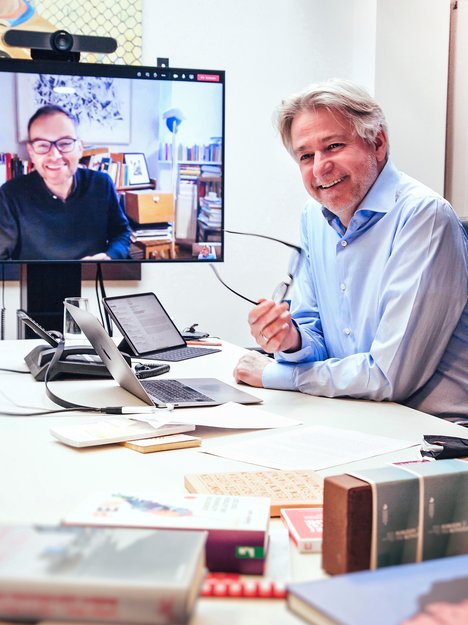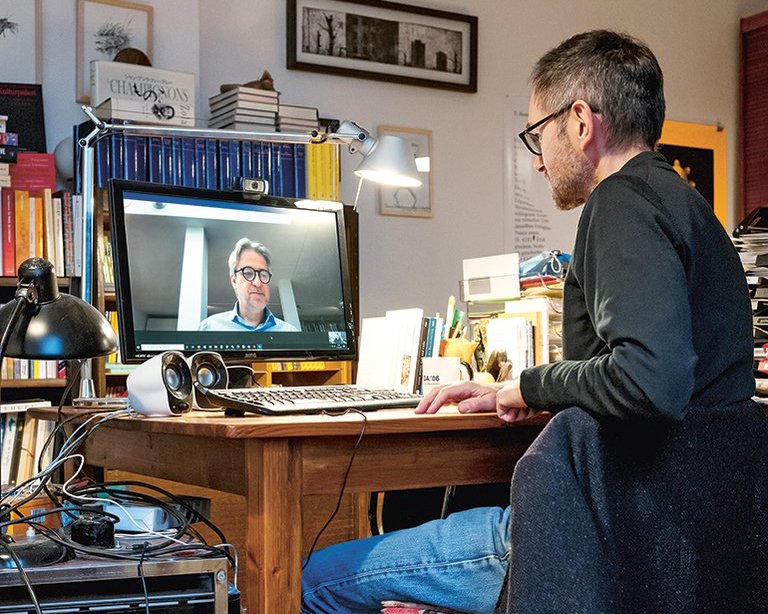Juergen Boos in Conversation with Andreas Rötzer

JB: You once said in an interview that as an independent publisher, you are at the mercy of the market. What did you mean by that?
AR: What I meant was that we’re not a subsidy publisher: we have to hold our ground in the marketplace and finance ourselves through sales. Whenever we have a success, the proceeds are invested in new books. I’ve always given myself the freedom to publish books that aren’t profitable, too, though – books that are very important in terms of our programme. But if you adjust your expectations a little, it’s perfectly possible to operate in a commercial way.
JB: Can you shape the market yourself – or create your own market?
AR: That’s what we managed to do with our ‘Naturkunden’ (‘Natural Histories’). If you’re lucky, you can capture the zeitgeist without becoming a slave to it. Ideally you want to come up with an innovation that’s capable of succeeding on the market. We also managed to do this with our ‘Fröhliche Wissenschaft’ (‘Joyful Wisdom’) series; once again, we created a market for ourselves.
JB: You do see some publishers that are financed partially by donations from patrons – but that’s precisely what you don’t want, is that right?
AR: For our ‘Natural Histories’, which have huge production costs, we were kindly awarded generous start-up funding to mitigate some of the risk, and to make the series possible at all. But I think the quality of a book is actually improved when it has to prove itself on the market. Of course, there’s a high level of risk involved, and tremendous effort required – on an ongoing basis. But the danger or the temptation of allowing publishing to become ‘art for art’s sake’ would otherwise be too great. I always see publishing as a political act as well, because it’s an act of public expression. We want and need our texts to reach an audience, and we want to publish books with genuine social relevance.
We want to publish books with genuine social relevance
JB: Your degree was in philosophy, and yet you started out at Matthes & Seitz as an accountant …
AR: The fact that I also trained as a psychiatric nurse is actually the thing that’s helped me most in my career … [laughs]. My philosophy degree didn’t help me land a job in publishing, but accounting certainly did. When Axel Matthes was looking for an accountant in 1999, I applied for the post because I really wanted to work at the company. Incredibly, I managed to persuade the head of the accounts department of my (non-existent) accounting skills, and she took me on. Then she retired and I took over from her.
JB: What made you want to go into publishing?
AR: It all started with my passion for literature and philosophy as a student. After that I worked in the antiquarian book trade for many years, which really helped me develop an understanding of what makes a quality text, and what makes a book valuable. When only five or ten out of 100 books in an estate pass the antiquarian’s test, it makes you realise how much rubbish gets produced. Informed by this experience, my goal is to publish books that will still have a value, an antiquarian value, in 30, 40 years’ time. That’s my guiding principle. I’m probably more of an antiquarian in disguise than a publisher.

Books are longlasting, they can’t get ‘used up’
JB: But you don’t only publish young authors – I’m thinking of Joshua Groß and Jakob Nolte – but also authors who’ve been published before, like Anne Weber, who has now gone on to win the German Book Prize. It’s clear that your publishing house has the power to get people talking about an author again, to make an author topical again. The same sort of thing happened with Joshua Groß. His work had been published before, but then he came to you and suddenly things really took off.
AR: It would be nice if that was always how it went, but it’s basically just a gamble every time. When it does work out, though, perhaps that does have something to do with the credibility we’ve acquired, and the context provided by our other authors. The diverse range of authors on our list is important. We’ve got canonical authors, new authors, established authors – one illuminates the others, so to speak, and draws attention to them. This also helps people rediscover previously lesser-known authors.
JB: Does your list feature many translations?
AR: I’d say about half our titles are translations – perhaps a little less than half now. We publish 100, 120 books a year, and around 40 to 50 of those are translations. So quite a large number, yes.

JB: In English-speaking countries, translations are often shunned – they cost a lot, and they don’t tend to sell well. It’s very different in Germany, where around 30 percent of all fiction titles are translations.
AR: Although it’s not a one-way street – we do also sell quite a lot of our titles abroad. Particularly philosophy, but also literature. And we’re doing very well in that regard these days. Partly thanks to international networking, and not least the Frankfurter Buchmesse.
JB: I’ll tell the team at the Buchmesse that – they’ll be very pleased to hear it. How did Anne Weber sell in other countries?
AR: By the end of 2020, we’d sold ten foreign rights licences.
JB: It won’t be an easy book to translate.
AR: It’s really quite difficult to capture the book’s complexity. Something could easily get lost in translation. So it will be a big challenge for the translators. But things are still going well, and we’re set to sell the rights in even more languages.
JB: How do you, as an independent publishing house, manage to hold your own against the big publishing conglomerates, both in terms of acquiring titles and in terms of selling books? Has that changed over time?
AR: I have esteemed colleagues at the big publishing houses – Regina Kammerer, for example, and Jonathan Beck – who really are wonderful colleagues, and I often exchange ideas with them. This proves that the publishing industry is not dominated by the fierce competitiveness found in other sectors. There’s a very pleasant kind of cooperation between different publishers. We’ve also developed our business a great deal over the past ten or fifteen years. There are more and more small bookshops championing good books, and they sell our titles. We’ve never worked with chains – the big chains have never accepted us. Our bedrock is the independent booksellers with their characterful selections. We know we can rely on them.
JB: How important is the review section to you?
AR: Very important, because it attracts authors. And it helps get more people talking about our themes.
JB: And how do you reach your readers directly, what sets you apart in that regard?
AR: One guiding principle I think we as a publisher must never lose sight of is the fact that we represent a kind of sincerity. A small publishing house only stands a chance if it can build trust – trust in the quality of its titles – and that’s what we’ve managed to do in recent years.
JB: Mr Rötzer, thank you very much for the conversation.


